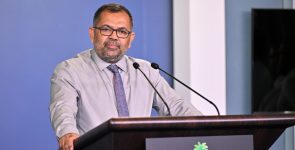
The Maldivian government recorded a fiscal surplus of MVR 2.2 billion as of 17 April 2025, buoyed by higher-than-expected revenue collections. Yet, behind the numbers lies a mounting concern: sluggish capital spending, driven in part by delays in implementing key infrastructure projects.
According to the Ministry of Finance’s latest Weekly Fiscal Developments report, cumulative government expenditure stood at MVR 9.5 billion, far below the MVR 11.7 billion collected in revenue and grants. While this has produced a temporary surplus, only MVR 743 million of the MVR 12.6 billion approved capital budget has been spent — a gap that signals deeper issues with project rollout.
This concern was echoed at a Cabinet working session held yesterday, where President Dr Mohamed Muizzu met with Cabinet Ministers and Managing Directors of major State-Owned Enterprises (SOEs), including MTCC, Fenaka, RDC, and MWSC. The session focused on accelerating top-priority infrastructure projects, several of which remain behind schedule.
President Muizzu urged all agencies to adhere to project timelines and stressed the need for transparency in public reporting. His intervention points to what many observers see as a key reason for the underutilisation of the capital budget: bottlenecks in execution, rather than funding constraints.
Although tax revenue remained steady at MVR 9 billion, gains were driven by an increase in Goods and Services Tax (GST), especially from the tourism sector, which contributed MVR 3.7 billion. Non-tax revenue, meanwhile, grew 41% year-on-year to reach MVR 2.6 billion, lifted by SOE dividends, resort rents, and airport fees.
Despite this robust inflow, the government’s development agenda remains hindered by slow disbursements under the Public Sector Investment Programme (PSIP), which saw just MVR 777 million spent so far this year — compared to MVR 2.7 billion during the same period in 2024.
As loan repayments and contributions to the Sovereign Development Fund continue to rise, the spotlight is increasingly shifting to the pace of infrastructure delivery. If delays persist, the surplus may prove short-lived — and the public may see fewer results on the ground.












